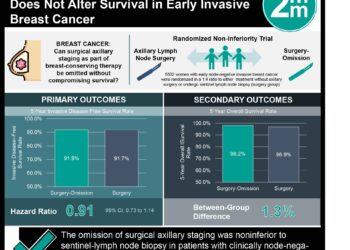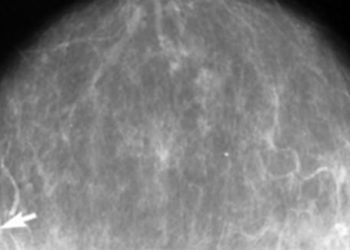Girls with familial breast cancer history are well-adjusted
1. Daughters of mothers with a family history of breast cancer or familial BRCA1/2 mutation (BCFH+) had better psychosocial adjustment than BCFH- controls.
2. BCFH+ girls had higher levels of breast cancer-specific distress and believed they had a higher risk for breast cancer than their peers, as compared to BCFH- controls.
Evidence Rating Level: 2 (Good)
Study Rundown: Breast cancer is the second most commonly diagnosed cancer among women in the United States. In recent years, genetic testing of familial breast cancer mutations has become more commonplace. Understanding the psychosocial impact of familial cancer history has implications on how and when information and testing options should be shared with children. This study is the first to explore the psychosocial impact of familial breast cancer in mothers and their pre-adolescent daughters, a time during which many healthy behavior patterns are entrenched. Results indicated that BCFH+ girls had better psychosocial adjustment and health behaviors than BCFH- girls. However, BCFH+ girls reported significantly greater breast cancer-specific distress, and they believed that they had higher breast cancer risk than their peers. In addition, higher levels of stress among BCFH+ girls were associated with increased levels of maternal anxiety and more limited family communication. While this study highlights avenues that can be addressed to improve psychosocial outcomes of girls with familial breast cancer history, it is limited by the selection of mother-daughter pairs as subjects.
Click to read the study, published today in Pediatrics
Relevant Reading: Management of an inherited predisposition to breast cancer
In-Depth [survey]: Participants included 869 girls ages 6 to 13 years (mean age 9.5 years), and their mothers, from 4 major US cities (New York City, Philadelphia, Salt Lake City, San Francisco) and Ontario, Canada between August 2011 and July 2013. The girls were from families with and without breast cancer in first or second-degree relatives or BRCA1/2 mutations. Both mothers and daughters ages 10-13 completed surveys, while mothers of younger girls were asked to answer on their behalf. Among all age groups, BCFH+ daughters had lower internalizing problems compared with BCFH- daughters (13% vs 15%, P=.02). Mothers in the BCFH+ group had higher general anxiety and breast cancer-specific distress compared to BCFH- mothers (7.1 vs 6.4, P=0.18 and 7.6 vs 3.2, P < .001 respectively). Similarly, BCFH+ girls experienced higher levels of breast cancer-related distress compared to BCFH- girls (12% vs 5%, P=.02). BCFH+ daughters were 2.8 times more likely to consider themselves at increased risk for breast cancer compared to their peers (95%CI 1.9-4.2). Furthermore, higher levels of BCFH+ daughter anxiety was associated with higher levels of maternal anxiety (P < .001) and poorer family communication (P=.02).
Image: CC
©2015 2 Minute Medicine, Inc. All rights reserved. No works may be reproduced without expressed written consent from 2 Minute Medicine, Inc. Inquire about licensing here. No article should be construed as medical advice and is not intended as such by the authors or by 2 Minute Medicine, Inc.







